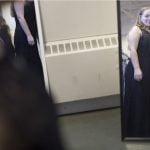
February was a time of hope and disappointment for wearers of the hijab at Tashkent’s International Islamic Academy.
For the first time in Uzbekistan’s history, a court heard a civil case about the Islamic headdress. At stake was the resolution of a standoff between the academy’s administration and young women angered about what they feel is the denial of religious self-expression.
That the drama should be playing out in what bills itself as an Islamic academy is the ultimate irony.
The suit against the International Islamic Academy was filed by 45-year-old Abduvahob Yakubov, the father of a young woman at the institute.
“I petitioned the court to cancel the internal rule prohibiting women from wearing hijab and scarves,” he told Eurasianet. “My daughter, Nozima Abdukharova, is in her second year of studies and has been prevented from going to class in her hijab.”
Yakubov is a lawyer by training, so he decided to take on the case himself.
At 3 p.m. on February 15, the entrance hall at Tashkent’s Shaykhontohur district court was packed. Police initially only allowed in representatives from the academy and their lawyers. But a large and excited crowd had also arrived, hoping to watch the highly unusual legal debate.
“I am very interested in how this hijab case turns out. It is the first time something like this is happening,” Ulugbek Safarov, 23, a student at Tashkent University of Information Technologies, told Eurasianet.
Safarov heard about the case through social media and decided to go in a gesture of support for his fellow students.
Botir Shermatov, a lawyer, traveled to Tashkent from Moscow out of curiosity to hear both sides of the argument. He predicted that although the case was unlikely to go the student’s way, it would undoubtedly draw considerable public interest.
“Under Uzbek law, the appearance of citizens in public places in religious attire may trigger a fine or administrative arrest for up to 15 days. Only [the clergy] can wear religious clothes,” Shermatov said.
Passions were on full display in the courtroom. Yakubov insisted on the abolition of dress requirements at the Islamic Academy, arguing that there are no legitimate grounds for banning hijabs in an educational institution.
Meanwhile, a representative from the International Islamic Academy, Lutfullo Abdukadyrov, showed the court a pamphlet detailing the rule of conduct for students.
“At the Islamic Academy, it is not just hijabs that girls cannot wear, the rule also goes for short skirts and jeans. Students are required to attend classes in a standard uniform – a form of clothing approved by the country’s Education Ministry,” Abdukadyrov said.
After hearing both sides, the court ruled in favor of the academy, arguing that it had violated no laws in imposing the dress code.
A court in Tashkent heard Yakubov’s appeal on March 13 and upheld the verdict passed down last month. Yakubov says he now intends to pursue the matter to Uzbekistan’s Supreme Court.
This standoff began in September. Shukhrat Yovkochev had shortly before that been appointed rector of the International Islamic Academy. Banning the hijab was his idea. Staff was posted at the entrance to the building and those students who declined to abide by the rule were forbidden from going to class.
The rule elicited mischievous mockery. Some students wore wigs instead of hijabs, to ensure they were nominally not exposing their uncovered heads. After class, they replaced the wigs with hijabs.
Despite its name, the International Islamic Academy is a secular institution, although it is also seen as part of a government effort to optimize the quality of the country’s religious education. It was created in April 2018 on the foundations of what was formerly called Tashkent Islamic University.
Nozima was not alone in taking her stand.
Luiza Muminjonova, 19, moved from her hometown of Urgench, around 1,000 kilometers west of Tashkent, to enroll in the International Islamic Academy. After passing the entrance exams, she signed up to take classes in the Pilgrimage Tourism department.
But when the first day rolled around, she was not allowed through the door.
“There is a sign at the entrance, it says that women may only wear dark skirts and white jackets. Skirts have to be worn below the knee. I was told to wear this uniform and take off the hijab. But I could not go along with that because those rules contradict my religious beliefs,” she said.
After quickly ratcheting up dozens of hours of unattended classes, Muminjonova was expelled.
Muminjonova said that she refuses to believe wearing a hijab can be legitimate ground for expelling somebody from school. And so she too turned to Yakubov for help filing a civil suit.
Her suit, which was heard on February 20, was also unsuccessful. Tashkent district court ruled that Muminjonova’s expulsion was in line with the rules of the International Islamic Academy.
While preparations for her legal campaign have been underway, Muminjonova has been working at a tourism agency and dedicating herself to improving her English, which she wants to parlay into studying tourism management.
“If the Uzbek court does not restore my rights, I will appeal to United Nations bodies responsible for upholding freedom of religion and belief,” she said.
Yakubov told Eurasianet there are even more young women who have been expelled from the Islamic Academy over their hijab.
“According to my information, there are about six young women,” he said. “But they still want to keep a low profile.”
This is not the first time that Uzbekistan has grappled – and chosen the path of prohibition – with the matter of religious piety in education.
Since the death of President Islam Karimov in 2016, many have become more bold in expressing their faith-based views in public. Last year, the government’s official policy on school uniforms, which allowed for the headscarves to be forbidden, provoked much umbrage among conservative commentators. Some wrote angered commentaries about it online, only to find themselves being summoned to the police station.
Ravshan Nazarov, a historian, falls on the secular side of the argument. The Islamic academy should be entitled to decide what its students may or may not wear, he said.
“Uzbekistan is constitutionally a secular state – there is a separation between religion and state. So we can consider this court’s ruling something of a legal precedent,” he said
[“source=eurasianet”]






